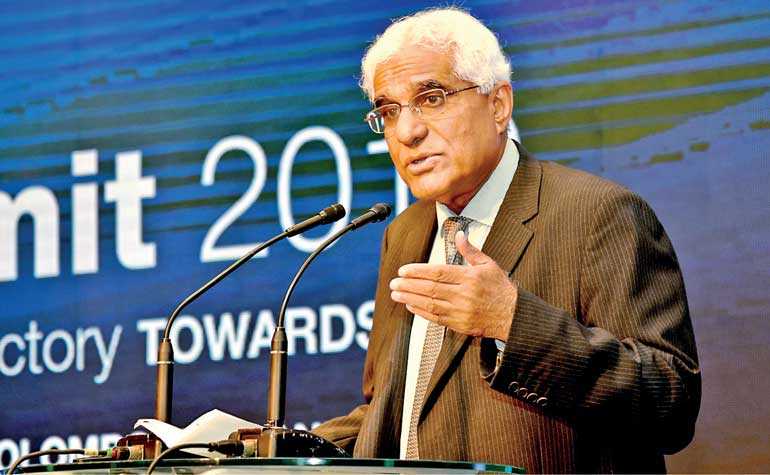Saturday Feb 21, 2026
Saturday Feb 21, 2026
Wednesday, 18 September 2019 00:00 - - {{hitsCtrl.values.hits}}

By Charumini de Silva
Central Bank Governor Dr. Indrajit Coomaraswamy yesterday said that policymakers and stakeholders across the economy must come together to “connect the dots” to set Sri Lanka on its desired growth trajectory.
The Governor made these comments while speaking at a panel discussion, which was part of the Ceylon Chamber of Commerce’s 19th Sri Lanka Economic Summit, titled 'Connecting the dots in Sri Lanka's economic development journey’.
"The nature of these dots - institutions, competitiveness and productivity, long-term planning, labour markets, exports and exchange rate, debts and deficits, inflation and high income economy - vary. Some may seem isolated, others may seem obscure and some may be missing, but we all need to come together to somehow connect the dots," he added.
With Sri Lanka graduating to the upper-middle income level by surpassing the $ 4,000 per capita threshold, he said that if annual average growth could be maintained at 8%, Sri Lanka would be in a position to make a leap in 15 years.
"Today we are witnessing a different world with declining global growth and slow-paced trade. It is tough to achieve 8% growth, but not impossible."
Dr. Coomaraswamy said the way to get out of the middle income trap was to boost competitiveness and innovation.
"With the upgrade there are two paradigm shifts in policymaking. We are now more subjected to discipline and we are also beginning to age before our economic transformation. Therefore, we need a growth framework to increase productivity and innovation," he added.
The Governor also said a lack of consistency and predictability in Sri Lanka's policies had resulted in large budget deficits and boom and bust cycles connected to elections.
Stating that Sri Lanka had been successful in maintaining inflation at single digits for over a decade, Dr. Coomaraswamy nevertheless asserted that achieving single-digit inflation did not in itself guarantee low and stable inflation in the future.
"To institutionalise this achievement of low single-digit inflation, the Central Bank announced its intention to adopt flexible inflation targeting (FIT) by 2020. Remarkable progress has been made in this regard, including the drafting of necessary amendments to the Monetary Law Act (MLA), allowing greater flexibility in the determination of the exchange rate, upgrading institutional and technical capacity within the bank and enhancing our communication strategy," he added.
The Governor also said market-based pricing was imperative for FIT to be successful in maintaining inflation at single digits.
"With the adoption of the fuel pricing formula, domestic petroleum prices adjust in response to changes in global oil prices. Similarly, other prices and tariffs that are currently administratively determined, such as electricity, transport, LPG and milk powder, need to be market-based," he added.
Despite the political pressure, Dr. Coomaraswamy said the Central Bank had also allowed the exchange rate to be increasingly determined by the market. He therefore believes measures to allow prices to be more market-based would help in the implementation of FIT.
He went on to reveal that maintaining sustained growth in exports has been challenging. "The average growth of exports from 1977 to 1999 was 10.7% and it has declined to 5.6% during the period of 2000-2018. The lack of export diversification needs addressing as regional peers have progressed with diversification. Sri Lanka also needs to diversify its exports with respect to markets. We should also fully utilise our potential using the existing product and market mix,” he added.
He said the recent movements in the exchange rate had also been supportive for exporters.
Stating that Foreign Direct Investment (FDI) was critical for emerging and developing economies such as Sri Lanka, Dr. Coomaraswamy said the country needed a few major anchor investors in key sectors to drive growth. However, it was noted that there was still room for massive improvement with respect to FDIs.
“For years and decades we have known what our economy is going to be like and what needs to be done, but we have not done it. This is a good opportunity for us to connect the dots and finish what we knew for a long time. The process is complicated and there are many groups with vested interests. However, we must complete it,” he said.